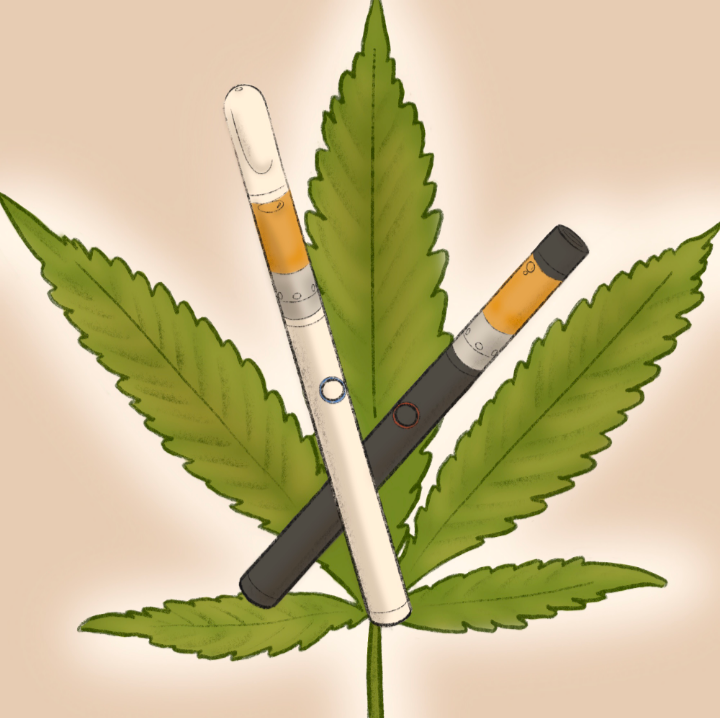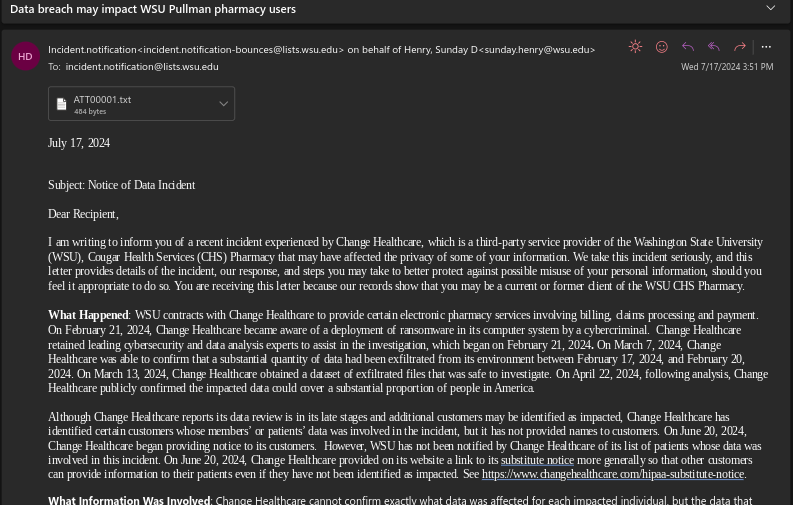Medical professionals and researchers are observing a rise in severe lung damage and even death among those who frequently smoke cannabis in vape or oil form due to the components used to make cannabis oil and e-cigarette products.
Cannabis e-cigarettes and oil are being revealed to be especially more harmful than other forms of smoking cannabis such as joints, pipes or even nicotine devices, said Joshua Stewart, Registered Respiratory Care Practictioner working on contact with Pullman Regional Hospital.
Cannabis e-cigarettes, otherwise referred to as carts or dab pens, have been quickly increasing in popularity, specifically among youth since their first introduction in the early 2000s. In 2019, 23% of United States 12th graders reported participating in cannabis vaping. Since then, usage has continued to increase, Stewart said.
Along with this increase in cannabis use, another form of inhaling cannabis oil, the medical community has seen an increase in hospitalization and death due to EVALI, or e-cigarette/vaping-associated lung injury, Stewart said.
“The main reason why cannabis vapes and oil are so damaging is due to a chemical called Vitamin E Acetate, a thickener, and diluent that is used when making cannabis vaping products. The ingredient is highly associated with EVALI,” Stewart said.
When Vitamin E Acetate is heated and smoked, it creates a substance that clings to the inside of the lung and can be found in the lungs for at least 80-90 days, and in some cases with daily smokers, three years, Stewart said. The consumption of Vitamin E Acetate is highly associated with the respiratory disease popcorn lung as well.
“Many young kids have died from smoking Cannabis vaping products. I have seen very young people need ventilators, and even lung transplants just from inhaling these chemicals, but that’s not saying everyone is, smoking is person specific,” Stewart said. “I have never seen a person who just smoked flower or from a pipe have those intensive injuries.”
Most people who come in with symptoms of lung injury have been using it for as little as under a year, however, it just depends on the person because everyone’s body reacts differently, Stewart said.
“In the past, it was more common to see symptoms of damaged lungs from smoking once a person was in their 30-40s or even 50s, however, cannabis oil causes lung injury a lot earlier on,” Stewart said.
The Center for Disease Control reported 2,807 hospitalizations and 68 deaths from EVALI from June 2019 to February 2020.
Out of those diagnosed with EVALI, 82% were Cannabis E-cigarette or CEC users. Thirty-three percent reported solely vaping cannabis, while 14% smoked from only nicotine devices, said Irfan Rahman, University of Rochester Dean professor of Environmental Medicine.
Rahman said he conducted a study named Cannabis Vaping: Existing and Emerging Modalities, Chemistry, and Pulmonary Toxicology, which sought to identify the components of Cannabis E-Cigarettes and oil in an attempt to understand why these cannabis products are causing such respiratory issues. He used a technology named Proton Nuclear Magnetic Resonance Spectroscopy to characterize ingredients in the cannabis oil.
Rahman said he tested 27 cannabis E-cigarette products, including 11 different brands. History findings showed that all of the products tested had false ingredients listed on the packaging that failed to accurately identify what was in the product.
None of the packages he observed in his study accurately describes the Delta 8 levels in the Cannabis E-cigarette and oil. Delta 8 is a synthetic form of the psychoactive component of THC. The levels of Delta 8 varied as much as 40%, Rahman said.
Another falsehood on the packaging was the impurities that were found in the oil. The brands failed to list the heavy metals that were detected such as mercury, nickel, lead and cobalt, Rahman said. When these ingredients such as heavy metals, Delta 8 and Vitamin E Acetate make their way into the lungs which can result in damaged tissue, bleeding and inflammation, all of which contribute to chronic coughing, asthma and EVALI.
“Young people are more likely to use cannabis vaping products because they are easily concealable and popular in schools,” Rahman said. “We are entering an era where young people are going to start getting very very sick.”
The U.S. Food and Drug Administration currently has no regulations on how these products are produced.
“We need to have real monitoring of these products so we know exactly what is in them and hopefully less harm caused to the lungs,” Rahman said.
While there is not currently a cure for EVALI, there are treatments that can assist in cleansing your lungs, however, the best thing you can do is stop smoking, Stewart said.
“If you insist on smoking, flowers are the best way to go,” Stewart said.
Eating fruits and vegetables, taking vitamin C supplements, regular exercise and even intermediate fasting can help heal lungs from EVALI, however, there’s no guarantee those will completely solve the problem Stewart said.



















Christina • Feb 14, 2024 at 9:20 pm
It’s nice he educates people on less damaging alternatives as opposed to just demonizing the person for having a vice and everything in one broad statement like so many other healthcare workers. The typical “weed is bad mmkay, or smoking is bad quit” just doesn’t have the same impact. That alone was good information and I really enjoyed reading it, and it definitely made me rethink some habits.